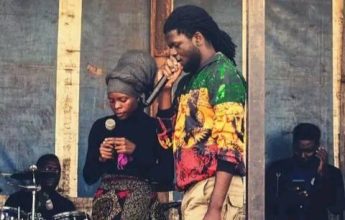Fikisa album out
 The traditional instruments come out clear. The bongo, the hoes, whistles are all set to announce the coming of the groundbreaking Fikisa’s album.
The traditional instruments come out clear. The bongo, the hoes, whistles are all set to announce the coming of the groundbreaking Fikisa’s album.
ÂÂ
The wait has been long, with thoughts for an early exit, hasty as their entry, coming to mind.
With the 14-cut collection now on the streets, Fikisa unpack themselves as a dominant force fusing deep-rooted traditional music elements and urban beats. Their unique touch gets listeners nodding their heads, stomping feet and jump on the dance-floor.
With various producers working on the album, the final product from the trioâ€â€Godffrey Thom and his nephews Saidi and Selemani Yusufâ€â€brings a necessary deviation from the usual Malawi beat.
“I identify with this music. It is kungwe. It reminds me of a time and space in the past,†said John Juma, a Blantyre-based worker who comes from Magomero in Chiradzulu after listening to the album.
The club bangers in the album come in different packages depending on the producer. For instance, Tapps Bandawe’s touch is evident in Pepani, a song against abortion.
Sonye’s feel reverberates in Domado, Afiti, Ademwiche (often referred to as Akamwire), Pepani, Che Issa, the sports victory chant Wazilira, and Bimbi, a song about the legendary mythical mystic among the Yao.
Daredevils recorded Walume Wawiwu, a song about the talkative jealous man, Nantchengwa and Loto la Farao while Anko Lai produced Adokotala while Lemekeza Phiri’s touch is evident in the Fikisa Interlude and JonJerry had a hand in Dansi Yavuta and Kumangwetu ku Balaka.
Coming in Chiyao and Chichewa, the lyrics cut across several issues. For once, Nantchengwa delves into the wisdom of the unexpected of mother nature’s products. It features a persona surprised how that bird, with so small head can think of building its nest high up a tree on a river bank. That, however, is not their major worry.
Nantchengwa wandilaula
Kamutu kang’onong’ono
Wandionera ndikusamba
Another expressive song is Loto la Farao. One can say this title is becoming more of a cliche in Malawi arts. Remember, Moda Fumulani has a song by that title and comedian Michael Usi has a play Maloto a Farao to his credit. The Fikisa song goes to the depth of the Israeli captivity in Egypt, when Pharaoh ordered the killing of all sons born to Israelite women.
Kalelo ku Iguputo
Kunali asirikali
Nyumba iliyonse
Akangomva kulira kwa bedi
Mukutanimo umo
Musabadwe mwana wa mwamuna
The trio trace their love for drums to 18 years ago through the Village Cultural Troupe. According to Thom, Fikisa is born from a musical tradition called Kungwe, which is chinamwali music played on the night before initiates are going back home.
Fikisa executive producer and Nyimbo Music Company CEO Daud Suleiman is on record as having said the album, which was supposed to be launched on January 15, had taken longer than expected to be on the market due to hitches in Tanzania where the album was reproduced.





